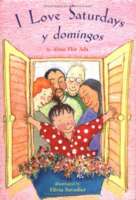
Saturdays and Sundays are very special days for the child in this story. On Saturdays, she visits Grandma and Grandpa, who come from a European-American background, and on Sundays — los domingos — she visits Abuelito y Abuelita, who are Mexican-American. While the two sets of grandparents are different in many ways, they also have a great deal in common — in particular, their love for their granddaughter. While we follow our narrator to the circus and the pier, share stories from her grandparents’ pasts, and celebrate her birthday, the depth and joy of both cultures are conveyed in Spanish and English. This affirmation of both heritages will speak to all children who want to know more about their own families and ethnic backgrounds.
Awards
Americas Award for Children’s and Young Adult Literature, Commended
Related: Fiction, Picture Book, Primary (ages 6-9), United States
- ISBN: 9780689318191
- Author: Flor Ada, Alma
- Illustrator: Savadier, Elivia
- Published: 2002, Atheneum
- Themes: Grandparents, Love, Mexican Americans, Stories
- Descriptors: Fiction, Picture Book, Primary (ages 6-9), United States
- No. of pages: 32

This book is a great multicultural book! The little girl spends her Saturdays with Grandma and Grandpa, dad’s parents who have a European background and Abuelito and Abuelita, mom’s parents who are hispanic. Because of her grandparents different cultures, the little girl is able to have a multicultural background and participates in a lot of different experiences. This book is a fantastic book that I just discovered. I am very excited to use it in my classroom next year. I think it will show children that everyone has different experiences and different backgrounds. It would open up students minds that people do things in different ways. I am really looking forward to using this book in my classroom!
This is a great book that shows the value of dual heritage. Having two sets of grandparents that are unique and different is so special to the little girl. After reading this book, it can open up for other children to talk about their heritage and realize that it is valued and meaningful. It could also be used to discuss various heritages. I also really liked the English and Spanish translations on each page.
In I Love Saturdays y Domingos, the narrator celebrates her weekends spent with her European-American and Latino extended families. Ada’s portrayal of both families as similarly loving and committed to their family traditions reinforces the message that we all share the capacity to love and be loved. Yet, Ada’s juxtaposition of the European-American and Latino traditions–along with her use of both Spanish and English–highlights the cultural specificity of the two families. At the end, when both families come together to celebrate her birthday, we get a sense of the narrator as an individual, and her individuality both incorporates and supersedes the discrete components of her cultural identity.
This is a wonderful book about a girl whose family is multicultural – her mother is Anglo-American and her father is Mexican American with some Native American ancestry as well. Consequently, the main character of the book, the little girl, is bilingual and Alma Flor Ada does a wonderful job of weaving Spanish into the English text seamlessly and in a way that is realistic by assigning the little girl a primary language, English, which most of the story is written in, and a second language that is spoken with the Latino side of her family; and she easily switches from one language to the other when both sides of the family are present.
This book presents being multicultural and bilingual in a positive light by embracing the differences of heritage, instilling a sense of pride in one’s family history, and presenting the two cultures as equal participants in the child’s life. It is a book that every bilingual, multicultural child can relate to personally, as well as teaching all children about the diversity of families in today’s increasingly global society.
This is a lovely book about a girl who has relatives from different ethnicities. The Latino and the Anglo grandparents are given equal weight and it is clear that the child has no difficulty navigating the differences between cultures. Spanish words are integrated in a way that makes it easy for English-speakers to understand. This is a wonderful story for children of mixed heritage, for children who are learning about Latino cultures, or for any child with a loving relationship with their grandparents.
This is the book I’ve been meaning to write, one where children who don’t speak Spanish can easily understand the Spanish words used, and where Spanish speaking children can enjoy reading a book with words in their language. Alma Flor Ada cleverly juxtaposes the little girl’s visits to her two sets of grandmothers so children learn that everybody can enjoy being with their grandparents, no matter what language they speak.